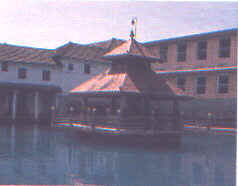Udupi is one of the most revered pilgrimage sites in Karnataka and is known
for its association with Madhvacharya, the founder of the dualistic - Dvaita
school of philosophy. Seven Muktistala pilgrimage sites
in Karnataka are Kollur, Udupi, Subrahmanya, Kumbasi, Kodeshwara, Sankaranarayana and Gokarna. Udupi is located at a distance of 36 km from
Mangalore, the nearest airport.

The name Udupi arises from the legend that Chandra
- the king of the stars (Udu-star, pa-king) performed penances towards Shiva (Chandramouleeswara)
here to relieve himself of the curse that had been inflicted upon him by Daksha
Prajapati.
Udupi is also known as Shivali - or
Shiva belli. Legend has it that Parasurama upon reclaiming land from the
sea, crowned his devotee Ramabhoja as a ruler. Ramabhoja killed a snake accidentally and
to redeem himself from sarpa dosha, he created a silver peetham with a snake carved on it,
installed Parasurama in the linga swaroopam and worshipped him as Ananteswara.
The Balakrishna temple at Udupi
enshrines an image of Krishna believed to have been made by the divine architect
Viswakarma.
Legend has it that Krishna's mother
Devaki and his wife Rukmini wished to enjoy his childhood pranks, at the end of the
Dwapara yuga. The divine architect Viswakarma then created this image of Krishna bearing a
churn in his right hand and a string in his left. Rukmini worshipped this image every day.
After Krishna's departure from this world, Arjuna is
believed to have hidden it, and the image is believed to have gotten covered with gopi
chandanam - a substance similar to sandal paste.
A ship proceding from Dwarka is beleived to
have carried this 'lump' bearing the image of Krishna and as it proceded through the
stormy seas, Madhvacharya sensed the divine cargo, and calmed the storm and saved the
ship. In return, he accepted this lump of a cargo, and discovered the image of Krishna.
Madhva then installed and worshipped this image at Udupi.
The Balakrishna temple founded by
Madhvacharya dates back to the 13th century CE. It is a modest structure enshrining
the image of Balakrishna in a sanctum viewed through a grating referred to as the Navagraha
kindi, which has nine square holes. The Navagraha window is covered with silver
sheets embossed with 24 different images of Krishna.
To the west of this is the Kanakadasa
mandapa. Legend has it that Krishna's image turned towards the western wall, which had
collapsed to reveal a full darshan of Krishna to Kanakadasa who had earlier been denied
entry into the temple.
There is also a shrine to Chenna Kesava
behind the sanctum. Behind this shrine is the eastern entrance of the sanctum, which is
open only on Vijayadasami. Also in the temple are shrines to Garuda and Hanuman. Madhva's
shrine is situated right next to the sanctum. There are also shrines to Subramanya and
Vaadiraaja in this temple.
Worship: Worship services here begin
at 4AM. The worship services carried out here are the Nirmalya Darshana, Ushatkaala pooja,
Panchamrita pooja, Udvardana pooja, Kalas Pooja, Go Pooja, Alankar Pooja, Maha Pooja,
Brindavana Pooja, Samara Seva, Ranga Seva, Seeveli Seva and the Ekanta Seva.
Festivals: Makara Sankranti in the
month of Makara (January 15) when the sun transits to the zodiac sign of Capricorn, a
grand chariot festival is celebrated - carrying images of Krishna, Chandamouleeswara and
Ananteshwara in procession. This seven day festival involves a float festival, and another
chariot festival the Bhramma Rathotsavam is celebrated on the 7th day, when the Aaraattu
is carried out in the Madhva Sarovar tank. Krishna Janmashtami is also celebrated with
great splendour here.
Other temples at and near Udupi
include the Ananteshwara and Chandramouleeswara temples mentioned above, Shakti
temples at Puttur, Kannarpadi, Bailur and Kadiyali, and Subramanya temples at Tangodu,
Mangodu, Aritodu and Muchilkodu and the Balarama temple at Vada Pandeshwara.
The Mutts around Udupi: Udupi as
mentioned before is the seat of Madhva's dvaita philosophy. Eight of Madhva's successors
headed mutts established by him in this area. These mutts are located at Palimar (Sri
Rama), Admar (Kaliyamardana Krishna), Krishnapura (Kaliyamardana Krishna), Sode (Bhu
Varaaha), Puthige (Vitthala) , Sirur (Vitthala), Kaniyur (Narasimha), and Pejawar
(Vitthala). The spectacular Paryaya festival, when the leadership of the
mutts changes, is celebrated once in two years.
See Also:
Seven Mukti Stalas of Karnataka
Kollur
Gokarna
Subrahmanya
